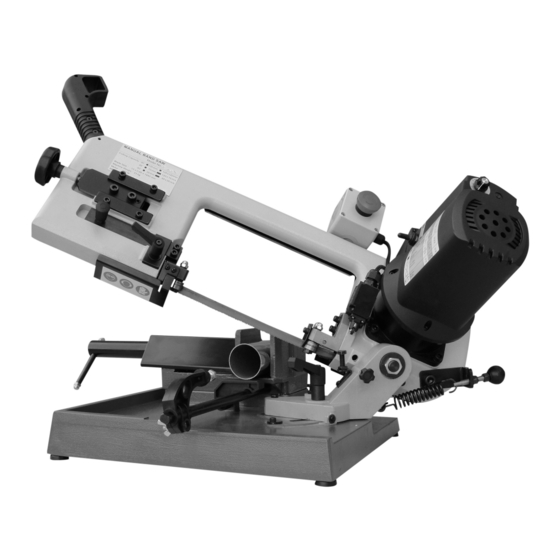Axminster UE-127DV1 Benutzerhandbuch - Seite 6
Blättern Sie online oder laden Sie pdf Benutzerhandbuch für Säge Axminster UE-127DV1 herunter. Axminster UE-127DV1 16 Seiten. Portable band saw

3. Special Safety Rules for Metal
Saw
WARNING: For your own safety, do not
operate your metal saw until it is completely
assembled and installed according to the
instructions...and until you have read and
understood the following.
Before Using the Saw
1.
Assembly and alignment.
2.
Learn the function and proper use of:
A.
The on-off start switch, trigger switch,
blade speed knob and stop button.
B.
The lower blade guards.
C.
The fixing saw bow latch.
D.
The bevel clamp, fence clamps, and
metal lock handle.
3.
Read and understand all safety instructions
and operating procedures throughout the
manual.
4.
Read the warning labels on the metal saw.
Before Each Use
1.
Inspect your saw. If any part of this metal
saw is missing, or bent, or has failed in any
way, or any electrical parts do not work
properly, turn the saw off and unplug the
saw. Replace damaged, missing, or failed
parts before using the saw again.
2.
Plan your work to protect your eyes, hands,
face and ears.
A.
Wear safety goggles (not glasses) that
comply with DIN 58214 (show on
package). Using any power tool can
result in foreign objects being thrown
into the eyes, which can result in
permanent eye damage. Goggles are
available at stores. Use of glasses or
use of goggles not in compliance with
DIN 58214 could result in severe injury
from breakage of the eye protection.
B.
For dusty operations, wear a face
shield along with safety goggles.
C.
To avoid injury from jams, slips or
thrown piece:
˙ It is important to choose the right
blade for the material and the type
of cutting you plan to do. This saw
is equipped with a bi-metallic
blade which can be used to cut
stainless steel, steel, iron, brass,
aluminum, wood, plastic and so
on.
˙ Make sure the direction of rotation
arrow on the blade matches the
direction arrow on the saw. The
blade teeth should always point
downward at the front of the saw.
˙ Make sure the blade is sharp,
undamaged and properly aligned.
With the saw unplugged, push the
power-head all the way down.
Head spin the blade and check for
clearance. If the blade hits
anything, make the adjustments
shown in the Maintaining
Maximum Cutting Capacity
section.
˙ Make sure the blade and arbor
collars are clean.
˙ Make sure all clamps and locks
are tight and there is no excessive
play in any parts.
˙ Never cut freehand:
a.
Brace your work piece solidly
against the fence and table top so
it will not rock or twist during the
cut. Make sure no debris is caught
beneath the work piece.
b.
Make sure no gaps between the
work piece, fence and table will let
the work piece shift after it is cut in
two.
c.
Use jigs, fixture or a different tool
for unstable work pieces.
˙ Never cut more than one work
piece at a time.
˙ Make sure the cut-off piece can
move sideways after it is cut off.
Otherwise, it could get wedged
against the blade and thrown
violently.
˙ Make sure bystanders are clear of
the tool and work piece. Keep
them clear of the area behind the
saw where debris will be thrown.
˙ Never turn your metal saw "ON"
before clearing everything except
the work piece and related support
devices off the table.
D.
To avoid risk of hearing damage, wear
ear plugs or muffs during extended
period of operation.
E.
To avoid being suddenly pulled into the
blade:
˙ Do not wear gloves.
˙ Remove all jewelry and loose
clothing.
˙ Tie back long hair.
˙ Roll long sleeves above the elbow.
- 4 -
